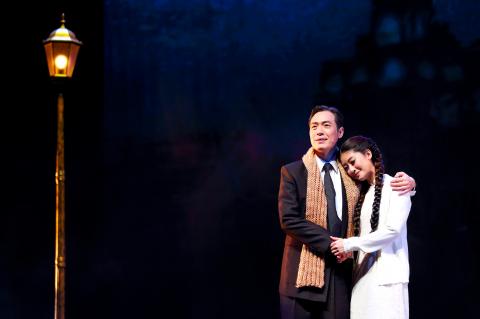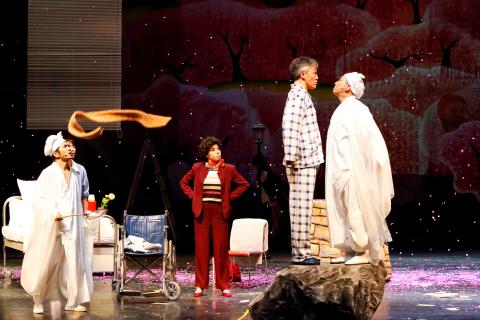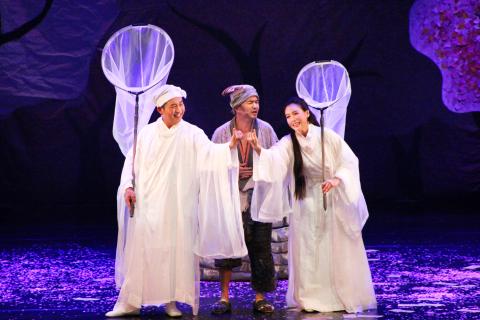The Secret Love in Peach Blossom Land (暗戀桃花源) was not the Taipei-based Performance Workshop’s (表演工作坊) first production; that honor went to That Night We Performed Crosstalk (那一夜,我們說相聲) in 1985.
Yet despite the company’s and founder Stan Lai’s (賴聲川) multitude of works since then, it is Secret Love in Peach Blossom Land, which premiered in 1986, that they remain most famous for.
The company has revived the play three times in Taiwan (1991, 1999 and 2006) — something previously unheard of in local theatrical circles — turned it into an award-winning film (1992’s The Peach Blossom Land), toured the world with it, including an 80-show run at the Oregon Shakepeare Festival in 2015 and staged the first official version in China in 2006, where it had been famous for years through bootleg DVDs and unauthorized performances.

Photo Courtesy of Performance Workshop
ICONIC CONTEMPORARY THEATER
Yet audiences, especially in the Chinese-speaking world, cannot get enough of the play. It is considered an iconic mainstay of contemporary Chinese theater.
So to mark the play’s 30th anniversary last year, Performance Workshop mounted a new production of the show, which it took to Singapore in February; Kaohsiung, Chungli and Chiayi in April and now moves into the National Theater in Taipei next week for six performances.

Photo Courtesy of Performance Workshop
Secret Love in Peach Blossom Land is about two companies that have accidentally been booked into same space for their dress rehearsals. Each has an opening night in just two days’ time, so neither is willing to concede the stage to the other.
One group needs to rehearse Secret Love, a tragedy about a couple separated by a China’s Civil War, centering on a dying man in Taipei and the woman he left in Shanghai.

Photo Courtesy of Performance Workshop
The other group is doing Peach Blossom Land, a comedy based on a classic Chinese poem about a lost fisherman who lands in a utopia where the people have no memories. However, the fisherman cannot forget his estranged wife, especially because two of the people he meets look just like his wife and her new lover.
As the two groups of players struggle for control of the space, they bicker, critique each other’s shows, steal each other’s props and eventually end up dividing the stage in half and trying to rehearse at the same time.
At its heart, Secret Love in Peach Blossom Land is about love, memories and the people we cannot forget, which is why it continues to strike a chord with so many people.
IMPROVISATION
Lai created the original production through structured improvisation with his cast, and continued to tinker with it in successive shows to keep things challenging. In 1991, that meant inviting movie star Brigitte Lin (林青霞) to make her theatrical debut as the Shanghai love, Yun Zhi-fan, a role she reprised in the film version.
In 1999, it was about inviting a younger generation of actors to step into the leading roles, while for the 20th anniversary production Lai invited the Ming Hwa Yuan Taiwanese Opera Company (明華園) to collaborate.
For this latest version, Lai turned the directing reins over to longtime Performance Workshop stalwart, actress and director Ismene Ting (丁乃箏), who played the role of the errant wife Chun Hua in the Peach Blossom Land between 1991 and 1999.
Ting said Lai had already perfected the play’s entire construct — the script, scenography and music selection — so her main job was “don’t mess it up.”
She chose some Performance Workshop regulars and other actors that she has worked with over the years, including Fan Kuang-yao (樊光耀), and Chu Chung-heng (屈中恆) — who were both so good in Ting’s A Blurry Kind of Love (愛朦朧,人朦朧) in 2015 — Chang Pen-yu (張本渝), Weng Quan-wei (翁銓偉) and Tang Tsung-sheng (唐從聖), who is perhaps better known as Action Tang.
Fan and Jacqueline Zhu (朱芷瑩) play the star-crossed lovers Jiang Bin-iu and Yun Zhi-fan in Secret Love, while Chu plays Master Yuan, Chang is Chun Hua and Tang is Lao Tao in the Peach Blossom Land portion.
The show comes in at just under three hours, including 20-minute intermission.

April 14 to April 20 In March 1947, Sising Katadrepan urged the government to drop the “high mountain people” (高山族) designation for Indigenous Taiwanese and refer to them as “Taiwan people” (台灣族). He considered the term derogatory, arguing that it made them sound like animals. The Taiwan Provincial Government agreed to stop using the term, stating that Indigenous Taiwanese suffered all sorts of discrimination and oppression under the Japanese and were forced to live in the mountains as outsiders to society. Now, under the new regime, they would be seen as equals, thus they should be henceforth

Last week, the the National Immigration Agency (NIA) told the legislature that more than 10,000 naturalized Taiwanese citizens from the People’s Republic of China (PRC) risked having their citizenship revoked if they failed to provide proof that they had renounced their Chinese household registration within the next three months. Renunciation is required under the Act Governing Relations Between the People of the Taiwan Area and the Mainland Area (臺灣地區與大陸地區人民關係條例), as amended in 2004, though it was only a legal requirement after 2000. Prior to that, it had been only an administrative requirement since the Nationality Act (國籍法) was established in

With over 80 works on display, this is Louise Bourgeois’ first solo show in Taiwan. Visitors are invited to traverse her world of love and hate, vengeance and acceptance, trauma and reconciliation. Dominating the entrance, the nine-foot-tall Crouching Spider (2003) greets visitors. The creature looms behind the glass facade, symbolic protector and gatekeeper to the intimate journey ahead. Bourgeois, best known for her giant spider sculptures, is one of the most influential artist of the twentieth century. Blending vulnerability and defiance through themes of sexuality, trauma and identity, her work reshaped the landscape of contemporary art with fearless honesty. “People are influenced by

The remains of this Japanese-era trail designed to protect the camphor industry make for a scenic day-hike, a fascinating overnight hike or a challenging multi-day adventure Maolin District (茂林) in Kaohsiung is well known for beautiful roadside scenery, waterfalls, the annual butterfly migration and indigenous culture. A lesser known but worthwhile destination here lies along the very top of the valley: the Liugui Security Path (六龜警備道). This relic of the Japanese era once isolated the Maolin valley from the outside world but now serves to draw tourists in. The path originally ran for about 50km, but not all of this trail is still easily walkable. The nicest section for a simple day hike is the heavily trafficked southern section above Maolin and Wanshan (萬山) villages. Remains of